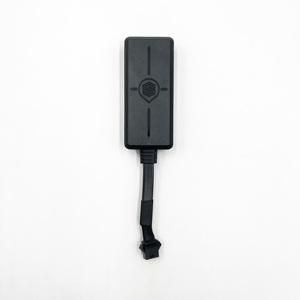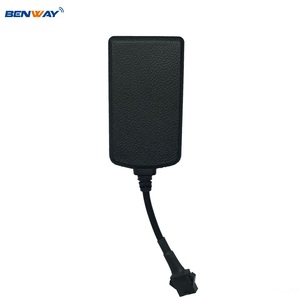(5966 products available)





































































































































































































































A GPS tracking device fleet is a system that uses Global Positioning System technology to track the location and movement of a fleet of vehicles. It consists of hardware devices installed in vehicles and software applications that process and display the tracking data. There are different types of GPS tracking devices for fleets, including;
Passive GPS trackers
Passive GPS trackers are devices that record and store the GPS location data of a vehicle during travel. The stored data can only be downloaded and analyzed later. These devices do not transmit real-time location data but are often used for fleet tracking by providing historical data about vehicle routes and locations.
Active GPS trackers
Active GPS trackers are devices used for tracking fleets of vehicles that continuously transmit real-time location data to a central server through cellular or satellite networks. This allows fleet managers to monitor the vehicles' location and movement in real time and access historical data on their travel routes and schedules.
Fleet management GPS
Fleet management GPS refers to a Global Positioning System technology used to monitor and manage the location and movement of a fleet of vehicles. It tracks vehicles' real-time locations, optimizes routes, and schedules services, ensuring timely deliveries and enhancing fuel efficiency. Additionally, fleet management GPS improves security by enabling the recovery of stolen vehicles through real-time tracking.
Personal GPS trackers
Personal GPS trackers are small, portable devices used to track the location of individuals or objects in real time. They monitor the whereabouts of people, such as children or elderly persons, and provide security by tracking valuable assets like vehicles or equipment. The trackers use cellular networks to transmit location data to a central server, allowing users to access real-time information through a web interface or mobile app.
Bluetooth GPS tracker
A Bluetooth GPS tracker is a device that uses Bluetooth technology to track the location of an object or person. These devices communicate with smartphones or other Bluetooth-enabled devices to provide location information. Bluetooth GPS trackers are often used to track personal belongings, such as keys or bags, rather than for fleet tracking. They have a limited range of tracking capabilities compared to GPS tracking devices for fleets but are useful for everyday items requiring location tracking.
There are various specifications to consider when buying a fleet tracking device for a vehicle, depending on business and personal needs.
Coverage
Some trackers have national coverage, while others have global coverage. A GPS tracker with global coverage is ideal for international shipping, while national coverage is sufficient for local deliveries.
Battery Life
Long battery life is essential for extended trips. A tracker with a long battery life of up to two weeks is ideal for long journeys. However, daily or weekly charging is sufficient for short trips.
Size and Weight
Small and lightweight trackers are easier to conceal and less likely to be discovered by thieves. Large and heavy trackers may be challenging to install but often come with additional features.
Waterproofing
Waterproof trackers are suitable for tracking vehicles in extreme weather conditions or off-road environments. Waterproofing is measured with an IP rating, with higher numbers indicating better protection against water and dust.
Real-time Tracking
Real-time tracking updates the user about the vehicle's location every few seconds. Instant alerts about unauthorized use or theft are provided by real-time tracking. Trackers with real-time tracking receive higher prices and are ideal for high-value vehicles.
Historical Data
Historical data tracking records the vehicle's location at regular intervals, allowing users to analyze the route taken. Historical tracking is useful for optimizing delivery routes and tracking employee performance.
Geofencing
Some GPS tracking devices for fleets have a geofencing feature that allows businesses to set virtual boundaries and receive alerts when vehicles enter or leave a designated area. This feature is particularly useful for monitoring the movement of vehicles in specific regions.
Speed Alerts
Speed alerts notify the user when the vehicle exceeds a certain speed. This feature is useful for ensuring compliance with speed limits and promoting safe driving practices.
Immobilization
Some advanced GPS trackers offer immobilization features, allowing users to remotely disable the vehicle's engine in case of theft. This added security can deter theft and increase the chances of recovering the vehicle.
Installation
Consider whether the GPS fleet tracking device requires professional installation or if it can be easily installed by following simple instructions. Plug-and-play devices are ideal for people who want to avoid the hassle of professional installation.
Monthly Subscription Fee
Most GPS trackers require a monthly subscription fee. It is advisable to compare the features included in the different plans and choose one that fits the budget.
Maintaining a GPS fleet tracking device is essential to ensure accurate tracking and prolong its lifespan. Here are some tips on how to maintain a GPS fleet tracking device.
By following these maintenance tips, businesses can ensure that their GPS fleet tracking devices work smoothly and accurately, optimizing fleet management and improving efficiency.
There are many factors to consider when choosing a suitable GPS fleet tracking device for business needs. Here are some of them:
Business Requirements
Understand the business's needs first. For example, if the company is involved in logistics, it will need a device that tracks routes, delivery times, and real-time location. Construction equipment tracking may track the location of construction equipment. Businesses can decide on the features they need by analyzing their requirements.
Coverage Area
Consider the coverage area of the GPS tracking device. Some devices have worldwide coverage, while others are limited to specific areas. If the business operates in remote locations, a device with global coverage and a reliable cellular network is necessary.
Real-time Tracking
Real-time tracking allows business owners to view their fleet's real-time location on a map. It helps optimize routes, monitor traffic conditions, and make timely decisions. Choose a GPS tracking device that provides accurate real-time tracking and an easy-to-use map interface.
Route Optimization
Route optimization features suggest the best routes based on real-time traffic conditions, delivery schedules, and vehicle locations. It helps reduce fuel costs, improve delivery efficiency, and enhance customer satisfaction. A good GPS tracking device can analyze historical data and predict traffic conditions to optimize routes.
Geofencing
Geofencing creates virtual boundaries on a map. Businesses can set up geofences to receive alerts when vehicles enter or exit specific areas. It is helpful for monitoring deliveries, ensuring compliance with designated routes, and preventing unauthorized vehicle use.
Data Security
Data security is vital when choosing a GPS tracking device. Ensure the device uses encryption methods to protect transmitted data. In addition, choose a provider that complies with relevant data protection laws and regulations to ensure business data security.
Many kinds of GPS trackers exist, and each has its own advantages. Some are easy to install on their own, while others require professional installation. Here are the steps for installing a fleet tracking device that allows for DIY.
Q1: How long does a GPS tracker last?
A1: The longevity of a GPS tracker in a fleet depends on its specifications and battery life. However, users can expect the battery of a GPS tracker to last between 24 hours to 10 days. They also come with rechargeable batteries that provide convenience to the user.
Q2: Why is GPS important for fleet management?
A2: GPS is important for fleet management as it helps track vehicles in real time. Businesses can monitor the routes their vehicles are using and the location of their delivery trucks. This technology ensures the safety of the fleet and helps prevent theft.
Q3: How accurate is GPS tracking?
A3: GPS tracking is accurate within 10 to 30 feet of the actual location. A new technology known as GPS Plus has been introduced, which increases the accuracy of GPS tracking to within 3 to 10 meters of the actual location.
Q4: Does GPS tracking require internet access?
A4: Yes. GPS tracking requires internet access to transmit location data to the user's device. This allows real-time tracking of the fleet's location and delivery status.